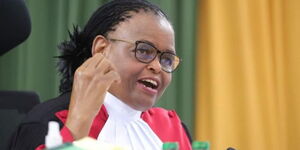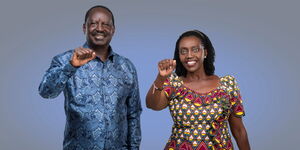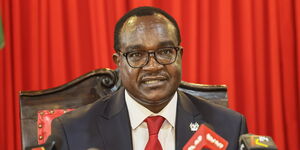President Uhuru Kenyatta and his deputy William Ruto's political marriage seems to be headed to a nasty 'divorce' that could rival Meru Senator Mithika Linturi's divorce in terms of publicity.
Despite their best efforts to put up a unified front by steering clear from declaring that the ruling Jubilee Party is currently spiralling down a dark hole, the President latest act of stripping Elgeyo-Marakwet Senator Kipchumba Murkomen and Nakuru Senator Susan Kihika of their lofty roles in the Senate speaks volumes.
It is important to note that both Senators have been very vocal in their support of DP Ruto
American author Patience Johnson once stated that 'In politics no permanent friends, no permanent enemies but permanent interests', and in the Kenyan context at least, this rings true.
Uhuru and Ruto's marriage is one of the longest-running ones, spanning as far back as 2002 (18 years) - if we are to include their courtship period in our analogy.
However, the two may have been enjoying a period of getting to know each long before that, if DP Ruto's own statements are to be our yardstick.
Speaking during an interview with NTV's Ken Mijungu, the DP pointed out that his relationship with the President started way back in 1998 when he was instrumental in ensuring that the budding son of the country's first president was nominated to Parliament.
During the dramatic years as partners, as is the case in actual marriages, there have been moments that can be classified as monumental.
Ruto Supports Uhuru in 2002
It would be fair to say that the two political titans found love in a hopeless place.
Following the 4-year courtship highlighted by Ruto, he went against the curve and backed Uhuru's first run for the presidency in 2002.
{"preview_thumbnail":"/files/styles/video_embed_wysiwyg_preview/public/video_thumbnails/WZ4k0tvstgo.jpg?itok=I94CBgZk","video_url":"","settings":{"responsive":1,"width":"854","height":"480","autoplay":0},"settings_summary":["Embedded Video (Responsive)."]}
The late former President Daniel arap Moi had handpicked the political rooky at the time to be his successor - a move that led to a mass exit from KANU (the ruling party at the time).
Interestingly, Bart Joseph Kibati who worked in national intelligence for over two decades, claimed that Moi's initial plan was to back former President Mwai Kibaki for the presidency and that it was Kibaki's rebuff that led the former Head of State to Uhuru.
In his book, Memoirs of a Kenyan Spymaster, Kibati details the intrigues surrounding the end of the KANU era.
“He said if Kibaki, who he had unsuccessfully tried to reach through (the late) Njenga Karume, continued to oppose him, then he would not hesitate to leave the leadership to Uhuru Kenyatta, Raila Odinga or somebody else,” reads an excerpt of Kibati's memoirs.
Uhuru ended up as the 1st runner up in that particular election, garnering 1,835,890 votes with Kibaki declared the outright winner with 3,646,277 votes under the wave that was dubbed the National Rainbow Coalition, that swept across the country at the time.
2007 Elections
The 2007 general election and its ugly aftermath is well documented.
Uhuru and Ruto were estranged during this period, with Ruto playing the role of a chief campaigner for Orange Democratic Movement (ODM) leader, Raila Odinga's bid for the presidency.
He was a member of the powerful Pentagon alongside Musalia Mudavadi, Joe Nyagah, Charity Ngilu and Najib Balala.
Uhuru on the other hand, who was KANU leader at the time threw his weight behind Kibaki's re-election.
Despite announcing that he would only serve for one term during his 2002 campaigns, Kibaki renigged and announced his candidacy under a new alliance called the Party of National Unity (PNU), which would include a number of parties, including KANU, the Democratic Party (DP), NARC–Kenya, FORD-Kenya, Ford–People and Shirikisho among others.
The two teams clashed on December 27, 2007, resulting in Kibaki's controversial victory that sparked the infamous Post-Election Violence (PEV).
The Great 2012 Reunion
After getting enduring a tumultuous period of separation during the hotly contested 2007 General Election, Uhuru and Ruto finally reunited and held a huge rally to announce the renewal of their vows on December 3, 2012.
The two were welcomed and cheered on by thousands at a joint rally that was held Nakuru. They went on to announce that Uhuru would be the presidential candidate and Ruto his able-bodied running mate.
"We have agreed we are uniting on behalf of the people of Kenya. Our alliance is not for fighting anyone. We are uniting for the sake of the people of Kenya," Uhuru stated at the time.
At the time, the two were facing trial at the International Criminal Court (ICC), after they were indicted over the violence that hit Kenya after the disputed 2007 elections.
"Those talking ill of Ruto and Uhuru are wasting their time. The ICC cases have formed the basis of debates but we are going to prove them wrong [and show] that Kenyans are united and want peace," a buoyant Ruto announced.
On March 3, 2013, Uhuru finally clinched the top seat, with official results stating that Uhuru beat Raila by 50.07% to 43.28%, avoiding a run-off by just 8,100 votes.
Despite his direct opponent contesting the results and presenting his case before the Supreme Court, Chief Justice at the time, Willy Mutunga, upheld Uhuru's election as president, rejecting challenges to the vote, saying the poll was free and fair.
"It is the decision of the court that the said elections were indeed conducted in compliance with the constitution and the law," he ruled at the time.
Incidentally, the dynamic duo both had their cases dropped by the ICC - Uhuru's on December 5, 2014, and Ruto's on April 2016.
2017 - Uhuruto Reloaded
The two leaders were back on the campaign trail once again in the build-up to the August 8, 2017, General Election.
However, this time the parameters were different, their marriage was now formal.
They went into the polls under the Jubilee Party - which morphed after the merger of 11 smaller parties on September 8, 2016, including Ruto's United Republican Party (URP).
{"preview_thumbnail":"/files/styles/video_embed_wysiwyg_preview/public/video_thumbnails/L62ypOpNDik.jpg?itok=i3IlzR3w","video_url":"","settings":{"responsive":1,"width":"854","height":"480","autoplay":0},"settings_summary":["Embedded Video (Responsive)."]}
Official results showed that the incumbent President, Uhuru Kenyatta, had been re-elected with 54% of the vote.
However, his main opponent, Raila Odinga, refused to accept the results and contested them in the Supreme Court.
On September 1, 2017, Chief Justice David Maraga nullified Kenyatta's election victory and ordered a new presidential election to take place within 60 days.
However, the Uhuruto power couple won the subsequent election, albeit with Raila announcing that he would not participate in a new presidential election without legal and constitutional guarantees against alleged electoral fraud.
The Raila Factor
March 9, 2018, could be tagged as the date on which the Uhuru and Ruto's union received a huge hit.
Kenyans woke to the unexpected news that the key leaders, Raila and Uhuru, who were at the helm of the divisive politics and hurling insults at each other, were putting their differences aside and uniting through a "Handshake".
This birthed the formation of two factions dubbed tanga tanga (linked with the DP) and kieleweke (linked with to Uhuru's supporters).
The two factions have been at war ever since, culminating in the highly publicized Parliamentary Group meeting that was held on Monday, May 11, at State House, that resulted in Murkomen and Kihika losing their titles in the Senate.
A lot has happened in between such as the Gazette Notice dated April 6, in which the Registrar of Political Parties announced that the ruling party intended to change members of the National Management Committee (NMC), who would be replaced by; Lucy Nyawira Macharia, Prof. Marete Marangu, Walter Nyambati, Jane Nampaso, and James Waweru.
These changes effected by party secretary-general Raphael Tuju, sparked a series of protests by DP Ruto, culminating in a letter he wrote out to the Registrar of Political Parties Anne Nderitu on Friday, April 10.
The Uhuruto union seems to be hanging on the very edge and the recent addition of Senator Gideon Moi's KANU Party to the Jubilee fold an interesting spanner that has been thrown to the works.
Will the marriage stand until the 2022 General Elections? Your guess is as good as mine.












